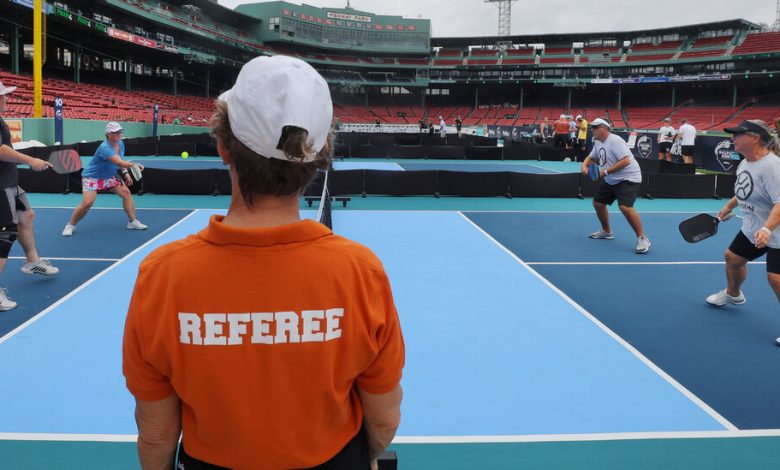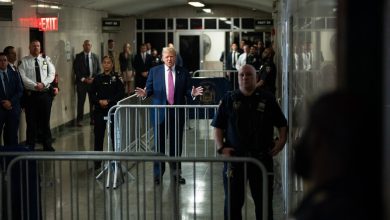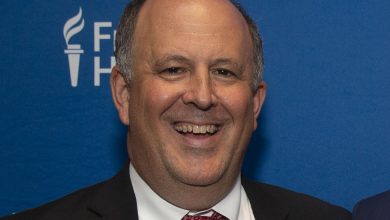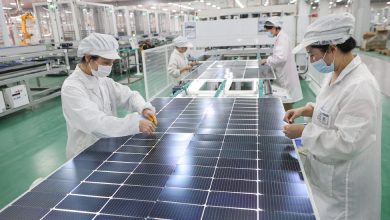Pickleball went pro. Can it profit?

As pickleball takes over the minds and courts of America, investors are pouncing on the opportunity to turn a favorite casual pickup game into a massive professional sport.
The Super Bowl champion Tom Brady invested in a pickleball expansion team alongside the tennis star Kim Clijsters in 2022. This year, Drake and Michael B. Jordan backed a Brooklyn team. Major League Pickleball, one of the sport’s two professional leagues, which was co-founded by the Texas-based billionaire Steve Kuhn, has grown from one event and eight teams in its 2021 debut to six events and 24 teams.
But as pingpong and some e-sports leagues have demonstrated, even if a huge number of people like to play a sport, it’s no guarantee that the masses will watch it. Can pickleball develop the television deals and star power of tennis and other more established sports?
Investors see opportunity in tennis’s less exclusive cousin. While pickleball has been around for decades, the sport — which, unlike tennis, requires little experience or athletic ability — exploded during the pandemic. Participation in pickleball almost doubled in 2022, growing by 85.7 percent year-over-year and by 158.6 percent over three years, according to The Sports & Fitness Industry Association.
The sport’s investors have been driven partly by a desire to get in early. As valuations for National Basketball Association and National Football League teams have leaped beyond the reach of even some billionaires, pickleball offers, by comparison, a more affordable opportunity. Valuations of pickleball teams reportedly range anywhere from $1 million to $10 million. The Washington Commanders just sold for $6 billion.
But those valuations are going up. “We may be getting close to a point where it’s almost too late to get in to expect a realistic return on investment,” said Patrick Rishe, the director of the sports business program at Washington University in St. Louis.
A lot hinges on television. “We don’t know whether pickleball is going to be a television event — if it’s not, there probably won’t be a lot of revenue attached to it,” said David Levy, the former president of the television and media conglomerate Turner. “Sponsors want what? Reach and branding.”
As a co-founder of Horizon Sports & Experiences, a sports and marketing agency, Mr. Levy this year launched the Pickleball Slam, an ESPN-broadcast event that featured retired the tennis pros Andre Agassi, John McEnroe and others competing for a million-dollar prize. It was viewed as a success, notching an average broadcast viewership of 237,000 adults under 50. But it borrowed its stars from another sport.
Pickleball proponents say the sport will eventually develop its own celebrity players.
But pickleball pessimists aren’t so sure. “It doesn’t make for good television,” Andrew Zimbalist, an economist at Smith College who has written several books about sports, told DealBook. He pointed out that while pingpong has long been played by millions of people in multiple countries, it hasn’t become a commercial success. “I think that pickleball is going to confront some of the same issues,” he said.
Is there another way? “The viewership side of it — people watching at home — is going to be a challenge,” said Richard Kleiman, a co-owner of a professional pickleball team and the founder of Thirty Five Ventures, a venture capital firm that focuses on sports investing. He said that rather than depending on big network T.V. deals, teams may make much of their profits from merchandise and events, like the U.S. Pickleball Nationals, which inked a sponsorship deal with the hospitality company Margaritaville last year.
Marc Lasry, the chief executive of the hedge fund Avenue Capital Group and one of sport’s earliest big ticket investors, is taking a long-term view on television pickleball riches.
“TV rights are like steroids,” he told DealBook. “Ultimately, the media rights will get there. The question is: is it a year from now or five years from now?”
Mr. Lasry, who sold his stake in the Milwaukee Bucks for $3.5 billion this year, noted the N.B.A. started with a three-year $1.5 million T.V. deal in 1979. It now wants a reported $75 billion for its rights when they come up for renewal.
Even if pickleball doesn’t follow a similar trajectory, Mr. Lasry thinks the sport is a bet worth taking: “If you say to me, I got 50 million people playing pickleball, but you’re never going to watch it on TV — Would you still want to own a piece of that business?”
The answer, he said, is “yes.” — Lauren Hirsch
IN CASE YOU MISSED IT
Donald Trump is indicted in Georgia. The former president and 18 others face charges stemming from efforts to overturn the 2020 presidential election in the state. Trump, the Republican front-runner for president, has been charged in at least four separate criminal cases since April.
Environmental activists win in Montana. A judge found that the state’s failure to consider the impact of warming temperatures when approving fossil fuel projects was unconstitutional. (The state is expected to appeal.) Similar cases seeking to hold oil giants and governments accountable for damages from climate disasters are winding their way through courts nationwide.
More signs of decline in China’s economy. Retail sales and industrial production both missed forecasts in July, according to data released on Tuesday, and Beijing said it would stop publishing youth unemployment figures weeks after it hit a record high. The I.M.F. has previously forecast that China would account for 35 percent of global growth this year, but that’s looking less likely.
The next frontier for corporate benefits: Menopause
In the same way that many companies looking to attract and retain talent have expanded their benefits packages to include fertility treatments and paid parental leave, many are now wrapping in menopause-specific care.
Doing so was a “no brainer,” said Nathalie Grenache, the senior vice president of people and culture at the health care company Sanofi, which began offering such menopause benefits to employees in October.
“If you feel truly supported throughout your life cycle, whether it is maternity or menopause, you’ll be more engaged,” she said.
Symptoms associated with the transition to menopause, which can last a decade, are often a drag on women’s careers. A study by the Mayo Clinic found that 15 percent of women either missed work or cut back on hours because of menopause symptoms, and that loss of productivity costs women an estimated $1.8 billion each year. Researchers in the U.K. also found that those who reported at least one disruptive menopausal symptom at age 50 were 43 percent more likely to have left their jobs by age 55.
Corporate benefits that address menopause can include virtual access to the small pool of roughly 1,000 certified specialists in the country, who can be difficult to find locally, and coverage of often expensive hormone treatment, which may not be included in some insurance plans.
Providers of menopause support services say uptake has been fast. Peppy, a gender-inclusive telehealth company founded in 2018 in Britain, offers menopause support in workplaces and began offering services in the U.S. in January. EBay, Nvidia, Wiley and Capgemini are all clients. In October, the health care benefits provider Maven launched a menopause product, which provides employees with app-based telehealth access to specialists and therapists. Within nine months, more than 150 companies had signed up, said Kate Ryder, its chief executive and founder. It has become “the fastest selling product,” she added, “in the history of all Maven products.”
More than 40 percent of female workers are at least 45, the age at which women typically transition to menopause (though some studies suggest women of color might begin earlier). But despite the high cost and common experience of menopause, it has mostly been ignored in the workplace. A 2023 survey by Bank of America found that 58 percent of women felt uncomfortable talking about menopause at work.
Existing laws may require companies to make accommodations beyond benefits. Liz Morris, the deputy director at the Center for WorkLife Law, an advocacy and research organization at the University of California College of the Law, argues that a patchwork of laws could be used to cover for menopause symptoms. They include the new Pregnant Workers Fairness Act that went into effect in June. It mandates employers provide accommodations for workers experiencing pregnancy, postpartum recovery and “related medical conditions,” which, Morris argued, could include the end of fertility.
Regardless of whether the so far untested argument holds up in court, Jennifer Weiss-Wolf, who runs the women’s leadership center at the New York University School of Law, says corporate benefits won’t be enough: Both further research that can help prevent symptoms and laws that explicitly ban discrimination are needed.
Corporate benefits, Weiss-Wolf said, are, at best, “just scratching at the surface.”
Saudi Arabia’s winning streak in sports
Saudi Arabia lured its biggest soccer star in a summer of big signings this week: the Brazilian player Neymar joined the Al Hilal team from Qatar-owned Paris Saint-Germain on a contract that will reportedly pay him $165 million a year.
The focus on the kingdom’s sports spending in recent months has been on a tentative peace deal between the PGA Tour and its rival, the Saudi-backed LIV Golf. But Neymar’s signing was a reminder that Riyadh’s push to diversify began with the world’s most popular sport. And lessons from its first big sports acquisition could offer clues to what happens next elsewhere.
Buying Newcastle United was the start of a global push. A consortium led by the Public Investment Fund, Saudi’s sovereign wealth fund, bought the English Premier League team in 2021 from a British retail tycoon for about $370 million. But the deal was contentious, coming just three years after Saudi agents murdered the journalist Jamal Khashoggi.
Success on the pitch helped dampen difficult questions. As the team has been transformed into one of the country’s best,questions about “sportswashing” have become less frequent, in what some have called a “deafening silence.” (This week, it was revealed that the British government invited Crown Prince Mohammed bin Salman, the kingdom’s de facto ruler, for an official visit.)
Saudi money is now being used to supercharge its domestic league. The signing last year of Cristiano Ronaldo, the Portuguese player considered one of the sport’s best ever, seemed an anomaly. But the league created a huge fund potentially worth more than $1 billion to pick off stars from Europe’s top leagues. Teams spent about $500 million this summer alone. (Even Saudi fans are spending big: Fabinho, a Brazilian player who was signed from Liverpool, was given a Rolex by an enthusiastic supporter after his first match for Al-Ittihad last week.)
What next for Saudi’s global sports push? The P.I.F. is spending billions on everything fromboxing to Formula One motor racing. It has held talks with the men’s ATP tennis tour about investments. Improbably, it will host the Asian Winter Games in 2029 and is also expected to bid for the soccer World Cup.
In Washington, calls persist for Yasir Al-Rumayyan, the head of the P.I.F., to testify before a Senate committee about the putative PGA-LIV deal .
As for Newcastle, the team said on Thursday that the Saudi men’s national team would play two matches in September at St. James’ Park, its home ground. Saudi’s sports push is about to come full circle.
Quiz time, global stock markets edition
Despite a shaky August performance, stocks have had a strong year. Most of those gains came from the roughly $10 trillion global rally in the first half of 2023. What makes that surge all the more impressive is that inflation and geopolitical instability are crimping economic growth worldwide.
Which of the following is the best-performing stock index this year?
-
The Nasdaq composite (U.S.)
-
The BUSE Merval index (Argentina)
-
Nikkei 225 (Japan)
-
Hang Seng (China)
Answer: Argentina’s Merval index. It’s jumped nearly threefold since the start of the year (in local currency terms) as of Thursday’s close, and is up more than 45 percent in U.S. dollar terms, an extraordinary rise considering the country’s debt woes, inflation running above 100 percent and stalled growth. Over the same period, the Nasdaq was up roughly 27 percent, according to Refinitiv data.
Ephrat Livni contributed reporting.
Thanks for reading!We’d like your feedback. Please email thoughts and suggestions to [email protected].




